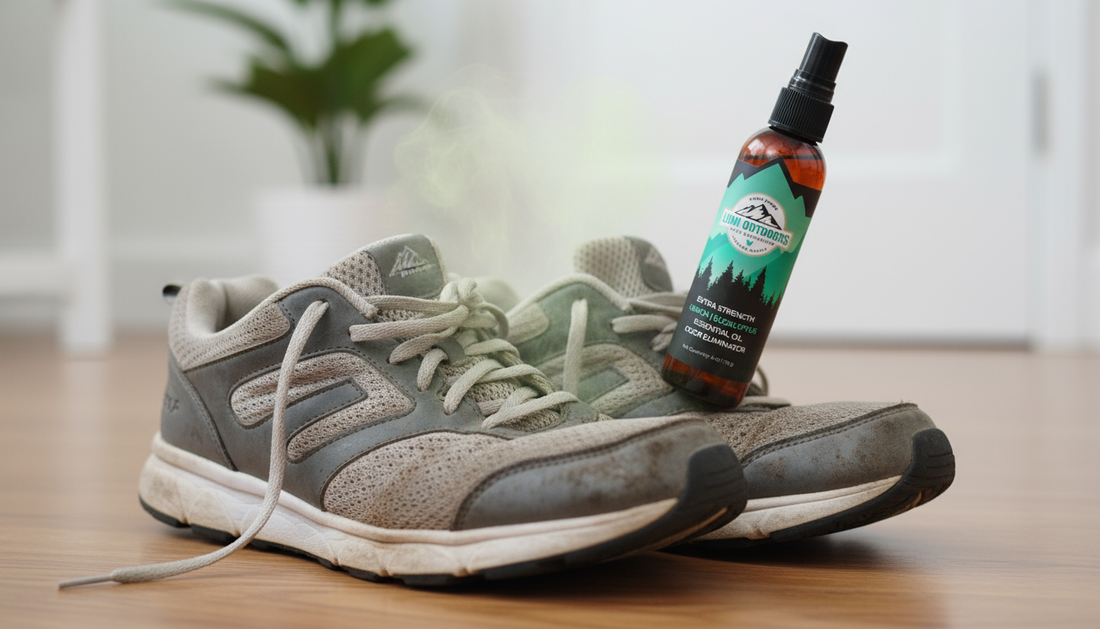
Isopropyl Alcohol for Shoe Odor: Myth or Miracle?
Share
Sorting Out Smelly Shoes: Does Isopropyl Alcohol Really Work?
Key Takeaways
- Isopropyl alcohol offers a temporary fix for shoe odor by killing some surface bacteria, but it doesn't neutralize the root cause of the smell.
- Frequent use can lead to shoe damage, drying out materials like leather and adhesives.
- For lasting freshness, natural enzyme-based deodorizers target and eliminate odor-causing compounds effectively and safely.
Ah, the dreaded shoe odor! It's a common household battle, isn't it? You open the closet, and whoosh – that familiar, unpleasant smell hits you. In a moment of desperation, you might’ve heard a whisper, or read a tip online: isopropyl alcohol for smelly shoes. It sounds like a quick, simple hack, right? After all, it's a disinfectant, a cleaner, a go-to for so many home woes. But when it comes to tackling those tenacious shoe smells, is it a miracle solution or just a temporary myth?

Let's dive in and unpack the science (and the reality) behind using rubbing alcohol on your footwear. We'll explore what makes shoes smell in the first place, how alcohol interacts with those smells, and ultimately, discover what truly works to keep your family's shoes smelling fresh, clean, and inviting.
Feature: Isopropyl Alcohol as a Germ Killer
What It Is:
Isopropyl alcohol, also known as rubbing alcohol, is a common chemical compound used widely as an antiseptic and solvent. It works by denaturing proteins and dissolving lipids, which are essential components of bacterial and fungal cells. In simpler terms, it breaks down and destroys the structure of these microorganisms.
What It Means For You:
- ✅ Temporary Bacteria Reduction: When applied to shoes, isopropyl alcohol can kill some of the surface bacteria that contribute to odor.
- ✅ Quick Drying: It evaporates quickly, which can help dry out some moisture in the shoe, another factor in odor.
- ❌ Doesn't Eliminate Odor Molecules: While it kills some microbes, it doesn't neutralize the volatile organic compounds (VOCs) that are the actual smell itself.
- ❌ Short-Lived Effect: The odor-causing bacteria will inevitably return, especially with continued wear and moisture.
Feature: Effect on Shoe Materials
What It Is:
Isopropyl alcohol is a strong solvent. This means it can dissolve or interact with various materials, including plastics, adhesives, and certain fabrics. Its evaporating nature also means it can draw moisture out of porous materials.
What It Means For You:
- ❌ Potential for Drying and Cracking: Repeated application can dry out leather, suede, and synthetic materials, making them stiff, brittle, and prone to cracking over time.
- ❌ Weakened Adhesives: The solvent properties might break down the glues used to construct shoes, leading to parts separating or soles coming off.
- ❌ Discoloration Risk: On some dyed fabrics or leathers, alcohol can cause fading or discoloration, leaving unsightly stains.
- ✅ Minor Use on Robust Shoes: For very occasional, light use on certain durable, synthetic athletic shoes, the immediate risk might be lower, but it’s still not ideal for regular treatment.
Feature: Tackling the Root Cause of Odor
What It Is:
Shoe odor isn't just about bacteria; it's about the byproducts of those bacteria breaking down sweat. When your feet sweat, it creates a warm, moist environment perfect for bacteria to thrive. These bacteria feast on sweat and dead skin cells, releasing pungent chemical compounds (mostly isovaleric acid) that cause that distinctive, unpleasant smell. Simply killing some bacteria doesn't address the existing odor molecules or prevent new ones from forming.

What It Means For You:
- ❌ Superficial Treatment: Isopropyl alcohol offers a superficial cleaning, but it doesn't get to the heart of why shoes smell. It's like sweeping dirt under a rug, rather than taking it outside.
- ✅ Need for Odor Neutralization: For true freshness, you need something that either absorbs these odor molecules, chemically transforms them, or uses enzymes to break them down permanently.
- ✅ Long-Term Solutions are Key: Relying on a quick germ-killer misses the point of sustainable shoe freshness. You need a solution that actively works against the odor-causing process.
For more insights into the true science behind shoe stench, you might find our article, The Science of Stink: How to Get Rid of Shoe Odor Naturally, particularly helpful.
Feature: Natural, Effective Alternatives for Lasting Freshness
What It Is:
Instead of harsh chemicals or temporary fixes, modern shoe deodorizers leverage natural ingredients to actively neutralize odor and maintain shoe health. These often include plant-based enzymes, essential oils, and absorbent minerals that tackle odor at its source.
What It Means For You:
- ✅ Enzyme-Based Elimination: Products like our Natural Extra Strength Lemon Eucalyptus Shoe Deodorizer Spray use powerful enzymes to break down and eliminate the odor-causing compounds, rather than just masking them. This means the smell is truly gone, not just covered up.
- ✅ Safe for All Shoe Materials: Formulated with natural ingredients, these sprays are gentle on leather, suede, synthetics, and all types of adhesives, preserving the longevity of your footwear.
- ✅ Refreshing, Not Overpowering Scents: Instead of chemical fumes, you get pleasant, natural aromas from essential oils that leave your shoes smelling genuinely fresh. For daily refresh, our Natural Citrus Tea Tree Shoe Deodorizer Spray is a fantastic choice.
- ✅ Preventative Power: Regular use helps prevent odor buildup, keeping shoes fresh day after day, week after week.
Curious about how these types of solutions work? Check out our guide: Is It Safe to Spray Shoe Deodorizer? Your Guide to Freshness.
The Clear Choice: A Quick Comparison
| Feature | Isopropyl Alcohol | Lumi Natural Shoe Deodorizers |
|---|---|---|
| Mechanism of Action | Kills some surface bacteria (temporary), evaporates moisture. | Enzymatic odor elimination (permanent), neutralizes odor molecules at the source. |
| Effect on Shoe Materials | Can dry out, crack, and discolor materials; may weaken adhesives. | Safe for all shoe types, preserves material integrity. |
| Odor Elimination Efficacy | Temporary masking, not true elimination. Odor returns quickly. | Complete and lasting odor elimination. Prevents future odor. |
| Safety for Use | Flammable, can be harsh on skin, chemical fumes. | Plant-based, family-safe, non-toxic, gentle on skin and shoes. |
While isopropyl alcohol might seem like a quick fix, it's often a case of 'penny wise, pound foolish.' For the longevity of your shoes and truly fresh air, investing in a dedicated, natural shoe deodorizer is undoubtedly the smarter, safer, and more effective choice. You're not just covering up; you're truly cleaning.
Frequently Asked Questions
Q: Can I use isopropyl alcohol on all shoe materials?
A: It's generally not recommended for delicate materials like suede, certain leathers, or shoes with intricate construction due to its drying and solvent properties. Even on synthetics, repeated use can cause deterioration. Always test a small, inconspicuous area first if you must, but for best results and shoe longevity, opt for a purpose-made shoe deodorizer.
Q: How often would I need to use isopropyl alcohol for shoe odor?
A: Because its effects are very temporary, you'd likely need to use it almost daily or after every wear to see any noticeable (though still superficial) difference. This frequent application significantly increases the risk of damaging your shoes over time.
Q: What's the best way to prevent shoe odor from developing in the first place?
A: Prevention is key! Here are a few tips:
- ✅ Rotate Shoes: Don't wear the same pair of shoes two days in a row; let them air out.
- ✅ Wear Moisture-Wicking Socks: These help keep your feet drier.
- ✅ Air Out Shoes: After wearing, remove insoles if possible and let shoes air dry completely.
- ✅ Use a Daily Deodorizer: A natural spray like our Natural Citrus Tea Tree Shoe Deodorizer Spray can be used regularly to prevent odor before it builds up.
Q: Are natural shoe deodorizers really effective for severe odors?
A: Absolutely! High-quality natural shoe deodorizers, especially those formulated with enzymes, are designed to tackle even the toughest odors. Products like our Natural Extra Strength Lemon Eucalyptus Shoe Deodorizer Spray are specifically engineered to eliminate the most stubborn smells from athletic shoes, work boots, and more, by breaking down the odor molecules at their source. They're often more effective in the long run than chemical alternatives because they address the root cause, not just the symptom.
So, there you have it. While isopropyl alcohol might seem like a tempting shortcut, it's rarely the miracle solution we hope for when it comes to persistent shoe odor. It's a temporary patch that can do more harm than good to your beloved footwear in the long run. For a genuinely fresh-smelling home and happy, healthy shoes, choosing a gentle, effective, and natural shoe deodorizer is the way to go. Give your shoes (and your nose!) the lasting relief they deserve. You'll thank yourself for it!
